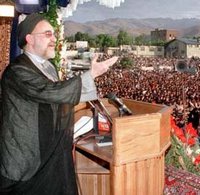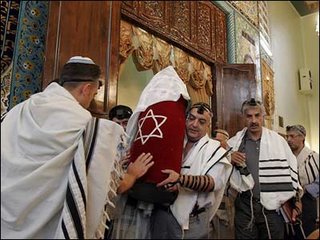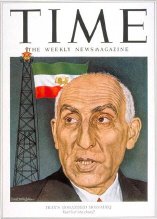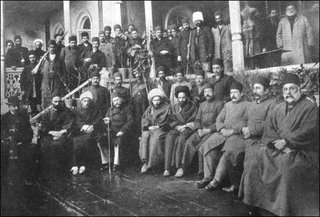

Mr. Khatami former president of Islamic Republic of Iran, whose election marked emerge of reform movement in Iran; will enter United States as a private individual tomorrow. He is accompanied by family members and staff members and is due to speak in National Cathedral at Washington DC. Washington Post reports that former President Carter has agreed to host Iran’s former president.
It is ironic to notice that President Carter carrier came to an end partially because of Islamic Revolution and hostage crisis, however President Khatami’s career began because of Islamic Revolution, otherwise he would have remained the quiet and intelligent head of Hamburg Islamic Center in Germany. The two could smile at this irony.
Little is known about the trip except for President Khatami scheduled talks in Washington DC and Chicago and his visit to Thomas Jeferson’s house at Monticello. However the diplomatic significance of President Khatami’s visit is lost on no one. Since his departure from office he has been acting as an unofficial envoy. In his recent visit to Japan he was engaged in negotiations with Japanese officials.
President Carter also is not unfamiliar with such functions. He has been doing the same thing since his departure from office. His role during Clinton administration and his activities as an observer of free elections at different countries across the globe are well known. Certainly two have much to discuss and both are credible enough to transfer and to correspond messages intended by Tehran and Washington. An unofficial way of offering & discussing unofficially what cannot be offered or discussed officially.
On the side the trip would spark some demonstration by opposition, human rights groups and Iranians in exile. Some usually attack any figure that comes from Iran, some attacked any official or former official of Islamic Republic and some want to use this opportunity to transmit their own agenda through public media. There will be some angry faces on TV, mudding the water and harming a peaceful mission.
Certainly one can criticize President Khatami and his time in the office. But one also must remember the very fact his failures were not because of his lack of qualities and decency. He initiated Dialogue of Civilization ideas and took firms steps to bring back Iran into global community. He did welcome relations with USA and tried his best to jump over the high wall of “distrust” between two countries. There is no doubt that he is a good man. There also is no doubt that he is most suited for the role of an ambassador of peace.
Today President Khatami and President Carter represent qualities of American and Iranian identities that are forgotten amidst war against terrorism and nuclear discussions. One is an adherent advocate of human rights and a hospitable Georgian, the other an advocate of peace and diplomacy. Their meeting is historic because who they are and what they represent, being in or out of office is irrelevant. The two certainly have a lot to talk about.






